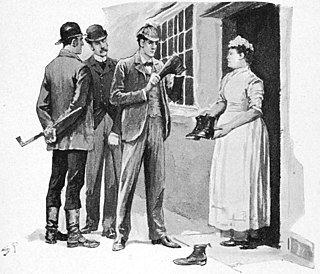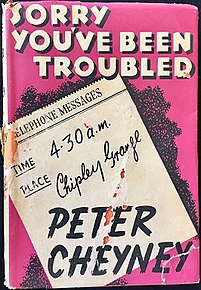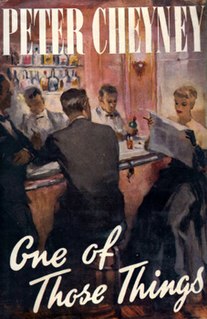
Detective fiction is a subgenre of crime fiction and mystery fiction in which an investigator or a detective—either professional, amateur or retired—investigates a crime, often murder. The detective genre began around the same time as speculative fiction and other genre fiction in the mid-nineteenth century and has remained extremely popular, particularly in novels. Some of the most famous heroes of detective fiction include C. Auguste Dupin, Sherlock Holmes, and Hercule Poirot. Juvenile stories featuring The Hardy Boys, Nancy Drew, and The Boxcar Children have also remained in print for several decades.

A whodunit or whodunnit is a complex, plot-driven variety of a detective story in which the puzzle regarding who committed the crime is the main focus. The reader or viewer is provided with the clues from which the identity of the perpetrator may be deduced before the story provides the revelation itself at its climax. The investigation is usually conducted by an eccentric, amateur, or semi-professional detective. This narrative development has been seen as a form of comedy in which order is restored to a threatened social calm.

Crime fiction, detective story, murder mystery, mystery novel, and police novel are terms used to describe narratives that centre on criminal acts and especially on the investigation, either by an amateur or a professional detective, of a serious crime, generally a murder. It is usually distinguished from mainstream fiction and other genres such as historical fiction or science fiction, but the boundaries are indistinct. Crime fiction has multiple subgenres, including detective fiction, courtroom drama, hard-boiled fiction, and legal thrillers. Most crime drama focuses on crime investigation and does not feature the courtroom. Suspense and mystery are key elements that are nearly ubiquitous to the genre.

The historical mystery or historical whodunit is a subgenre of two literary genres, historical fiction and mystery fiction. These works are set in a time period considered historical from the author's perspective, and the central plot involves the solving of a mystery or crime. Though works combining these genres have existed since at least the early 20th century, many credit Ellis Peters's Cadfael Chronicles (1977–1994) for popularizing what would become known as the historical mystery. The increasing popularity and prevalence of this type of fiction in subsequent decades has spawned a distinct subgenre recognized by the publishing industry and libraries. Publishers Weekly noted in 2010 of the genre, "The past decade has seen an explosion in both quantity and quality. Never before have so many historical mysteries been published, by so many gifted writers, and covering such a wide range of times and places." Editor Keith Kahla concurs, "From a small group of writers with a very specialized audience, the historical mystery has become a critically acclaimed, award-winning genre with a toehold on the New York Times bestseller list."

Mystery is a fiction genre where the nature of an event, usually a murder or other crime, remains mysterious until the end of the story. Often within a closed circle of suspects, each suspect is usually provided with a credible motive and a reasonable opportunity for committing the crime. The central character is often a detective, who eventually solves the mystery by logical deduction from facts presented to the reader. Some mystery books are non-fiction. Mystery fiction can be detective stories in which the emphasis is on the puzzle or suspense element and its logical solution such as a whodunit. Mystery fiction can be contrasted with hardboiled detective stories, which focus on action and gritty realism.
The Golden Age of Detective Fiction was an era of classic murder mystery novels of similar patterns and styles, predominantly in the 1920s and 1930s.

Reginald Evelyn Peter Southouse-Cheyney, known as Peter Cheyney, was a British crime fiction writer who flourished between 1936 and 1951. Cheyney is perhaps best known for his short stories and novels about agent/detective Lemmy Caution, which, starting in 1953, were adapted into a series of French movies, all starring Eddie Constantine. Another popular creation was the private detective Slim Callaghan who also appeared in a series of novels and subsequent film adaptations.

Peter (Harmer) Lovesey, also known by his pen name Peter Lear, is a British writer of historical and contemporary detective novels and short stories. His best-known series characters are Sergeant Cribb, a Victorian-era police detective based in London, and Peter Diamond, a modern-day police detective in Bath.

Meet Mr. Callaghan is a 1954 British crime drama film directed by Charles Saunders and starring Derrick De Marney. Based on the 1938 novel The Urgent Hangman by Peter Cheyney, which Cheyney had then turned into a play.

Dangerous Curves is a 1939 thriller novel by the British writer Peter Cheyney. It was the second novel featuring his private detective character Slim Callaghan, following The Urgent Hangman (1938). Callaghan is hired by Mrs. Riverton to find her missing stepson, who she openly admits she despises.

The Urgent Hangman is a 1938 thriller novel by the British writer Peter Cheyney. It introduced the fictional London-based private detective Slim Callaghan, the first in a series of seven novels as well as two short story collections.

They Never Say When is a 1944 thriller novel by the British writer Peter Cheyney. It is the sixth in his series of novels featuring the London private detective Slim Callaghan, a British version of the increasingly popular hardboiled American detectives.

Uneasy Terms is a 1946 crime thriller novel by the British writer Peter Cheyney. It was the seventh and last in his series featuring the London-based private detective Slim Callaghan, a British version of the hardboiled heroes of American writing.

Sorry You've Been Troubled is a 1942 thriller novel by the British writer Peter Cheyney. It was the fifth book in his series featuring the hardboiled London-based private detective Slim Callaghan. It was published in the United States under the alternative title of Farewell to the Admiral.

Dark Duet is a 1942 spy thriller novel by the British writer Peter Cheyney. Cheyney had become known for his hardboiled crime thrillers featuring Lemmy Caution and Slim Callaghan, but this novel was his first fully-fledged espionage novel. The novel is set in wartime London, Lisbon and Ireland. It was published in the United States with the alternative title The Counterspy Murders.

Dance Without Music is a 1947 thriller novel by the British writer Peter Cheyney. While Cheyney had gained his reputation with series about two celebrated characters Lemmy Caution and Slim Callaghan, he also wrote several popular stand-alone novels about hardboiled private detectives such as this. It was serialised in Britain by The News of the World. In the United States it was published by Dodd Mead in 1948.

One of Those Things is a 1949 thriller novel by the British writer Peter Cheyney. Although best known for his series featuring Lemmy Caution and Slim Callaghan, this was one of several stand-alone novels he wrote featuring hardboiled private detectives. It was also published under the alternative title Mistress Murder.
Slim Callaghan is a fictional London-based private detective created by the writer Peter Cheyney. Like another of Cheyney's characters, the FBI agent Lemmy Caution, he was constructed as a British response to the more hardboiled detectives of American fiction such as Sam Spade and Philip Marlowe.

It Couldn't Matter Less is a 1941 thriller novel by the British writer Peter Cheyney. It is the fourth in a series of novels featuring the London-based private detective Slim Callaghan who enjoyed a series of dangerous adventures similar in style to the hardboiled American detectives created by Raymond Chandler and Dashiell Hammett. It was published in the United States as Set-Up for Murder.

Slim Callaghan Intervenes is a 1964 West German crime television series broadcast on ZDF in eight episodes. The programme was based on the series of novels by British writer Peter Cheyney featuring the London-based private detective Slim Callaghan. In the television adaptation Callaghan is operating his own agency in Munich. He is played by Viktor de Kowa while Eva Pflug featured as his loyal secretary Steffie.


















